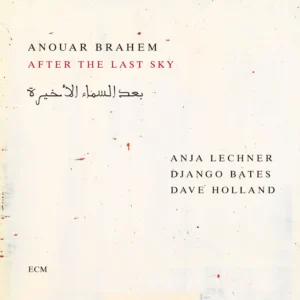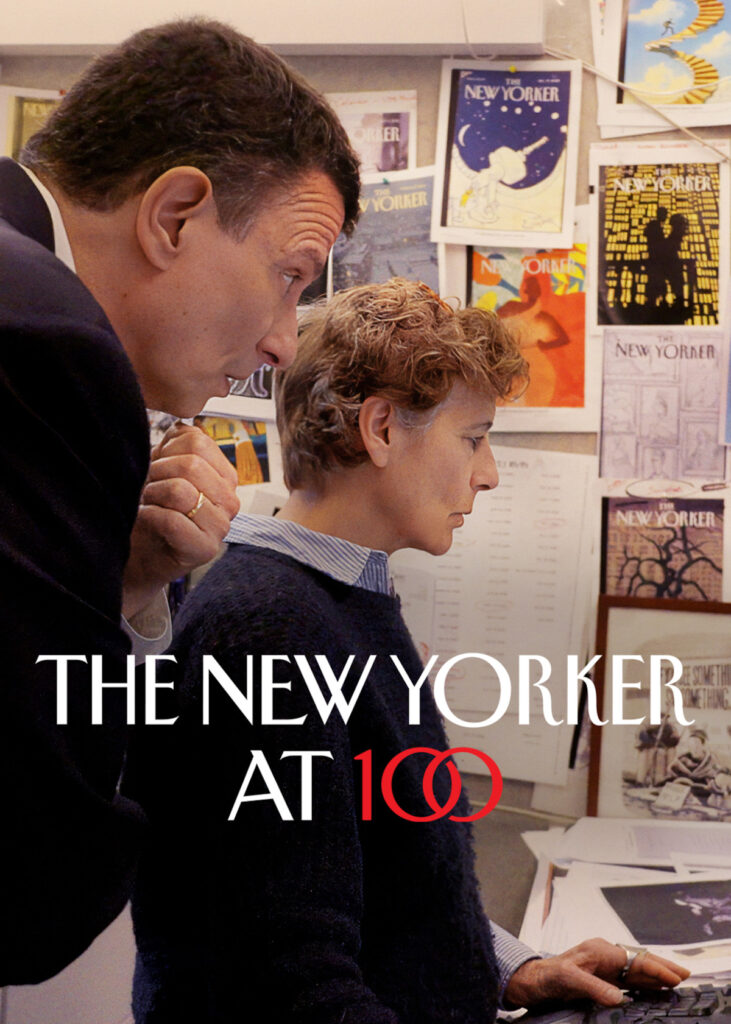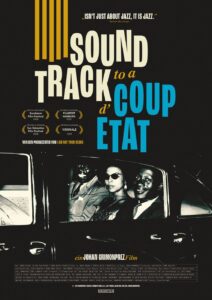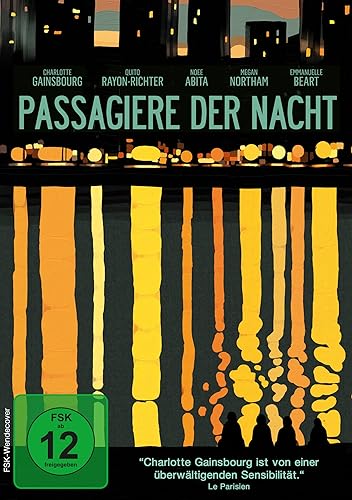Ringing in the New Year with Dino Saluzzi

Ringing in the New Year with Dino Saluzzi I know, it’s a little late for a Best of 2025 list, and as most of you know, I don’t make “best of” lists. But I will add to my last compilation of random brain farts, Dino Saluzzi’s brilliant EL VIEJO CAMINANTE, with Jacob Young on steel string and electric, and Jose Saluzzi on nylon string guitars. It’s one of those sleepers: At first it didn’t seem like a lot was going on, but I kept coming back to it anyway. I even wound up transcribing the first two songs, which the Slo Mo Bros duo has now placed into its ever expanding repertoire. (There are well over 100 mostly “hand transcribed” tunes in our book now.) Honestly, I am tempted to transcribe the evocative and mysterious third tune “Quiet March” as well as several others.
Dino Saluzzi turned 90 last year, and presents himself on this album as an artist with nothing to prove. Indeed, he doesn’t have to. From the beginning of his career, he forged a signature sound on the bandoneon that no one else can match. In that regard, he reminds me of the late Toots Thielmans, who also always sounded exactly like himself once he switched from guitar to chromatic harmonica, also an instrument which very few jazz players have had the fortitude to take on. Both Toots and Dino have a very unique manner of phrasing; both developed a unique way of “skittering across time” in a way that is wholly original and completely natural. Both are also incredibly melodic improvisers, and both were/are still performing at 90!
This album consists of four tunes penned by Saluzzi, three compositions by Jacob Young and one by Saluzzi’s son, Jose Marie; it is filled out with two standards, “Someday My Prince Will Come” and “My One and Only Love.”
The album drips with a kind of laconic, nostalgia that makes one remember another life, a time when things were slower and more romantic. Occasionally dipping into melancholy, this poignant music glistens with the soft focus sheen of golden memories that have been polished to perfection over many well lived decades.
Saluzzi allows the younger players plenty of space to solo and oftentimes lays out and lets the guitars do the heavy lifting. But when he does solo, like all great improvisers, he is a fabulous storyteller. There is something so incredibly personal about the performances here. It’s almost as though you’re sitting in a room with these three players, sipping a glass of cognac around the fireplace, the flickering light filling the room with wistful comfort as your mind drifts to happier years long gone. It doesn’t matter that you never got the chance to visit old Buenos Aires because, by the end of the album, you almost feel as though you had.
The highest praise I can give this album is this: When we had guests over for New Year’s Eve dinner, this is the album I chose to put on. No one said anything about it, but everyone was feeling it warming the room, its simpatico melodies and textures gently wafting around the laughter and conversation as we rang in 2026, hoping against all odds for better times ahead.
Happy New Year to all.
„glow, glow, afterglow“ – monthly revelations (January 2026)
Glow Factor 10 collection: Pharoah Sanders has made „TAUHID“, Jan Garbarek has made „DIS“, Brian, Roger and Daniel have made „Apollo“, Van Morrison has made „VEEDON FLEECE“, Julian Priester has made „LOVE, LOVE“, Julie Tippetts has made „SUNSET GLOW“, David Darling has made „CELLO“, Laurie Spiegel has made „THE EXPANDING UNIVERSE“, Arve Henriksen has made „CHIAROSCURO“, Bill Callahan has made „APOCALYPSE“, Lambchop has made „SHOWTUNES“, and Steve Tibbetts has made „CLOSE“.

album Björn Meyer: Convergence
archive Alabaster DePlume: To Cy and Lee – Instrumentals Vol. 1Ganz besonders gut geht Sternegucken hier, wo ich in den kommenden 14 Tagen bin. Denn Pellworm darf sich ganz offiziell als Sterneninsel bezeichnen und hat den Titel von der International Dark-Sky Association (IDA) verliehen bekommen. Die Insel ist umgeben von geringer Lichtverschmutzung, wodurch sich ein gigantischer Sternenhimmel über Pellworm erstreckt. Allein die Wolkendecken müssen sich verflüchtigen. Nun gut, „Apollo“ habe ich jedenfalls dabei, das Meisterstück von Brian, Roger und Daniel, natürlich mit der zweiten Weltraumreise 36 Jahre später. Wann hat ein Trio nach so langer Zeit noch mal zusammen gefunden, und die eigene Klasse gewahrt, statt matten Abglanz zu liefern?! Anbei, etwas anders geordnet, die Offenbarungen des Januars (wir sehen das zeitlich nicht so eng und sammeln nur allerlei Faszinierendes der jüngeren Gegenwart!)
film Sentimental Value
binge Blue Lights, season 3 (1,2,3, auf Prime in Original)prose Noch einen Monat lang Jan Reetzes Buch über Joe Meek
talk Michaels 2016 Interview mit Steve Tibbetts zu LIFE Of *
radio Zum definitiv letzten Mal die letzte lange Nacht der Klanghorizonte*zur Einstimmung auf das Steve Tibbetts Portrait am 22.1. um 21.05 Uhr im DLF
Afterglow Pellworm-style: Hello, darkness, my old friend! „The solstice has arrived and we have entered “Evening Star weather,” in honor of the second collaborative album from pioneering English musicians Brian Eno and Robert Fripp, released in December of 1975. Fifty years on, you can hear large swaths of the ambient genre echoing through Evening Star: The cosmic calm of Steve Roach’s classic 1988 album Structures From Silence. The neo-classical predilections of Eluvium and Stars of the Lid. The billowing atmosphere of Wolfgang Voigt’s music under the name Gas. The cracked nostalgia of Fennesz’s Endless Summer. Kyle Bobby Dunn’s commitment to drones that . . .“ (Aquarium Drunkard)
Afterglow „Lebendige Würzburger Melancholie“ (1978)
Afterglow „Lanzarote Dreaming 2017“ (für Lajlas Stillebenlektion)
Afterglow „Bergeinöden 1982“ (in loving memory of Gudrun Hörner-Schwarz)
Als ich dann Tom Verlaine hörte, war Ende Gelände
Vielleicht hat das alles damit zu tun, dass
ich heute Müll aus fünf Jahren auf meine Deponie brachte,
und dabei das ganze Album Too-Rye-Aye hörte,
ohne es zu wollen besteige ich dabei ein Luftschiff,
dass mich ins Jahr 1982 transportiert
unweit der tschechischen Grenze, Gllückstaumel
und Desaster insclusive Aber allles, alles mit dem Verve
der Stimme von Kevin Rowland. Also legte ich los,
im Grunde zu müde, mit dem Film „Passagiere der Nacht“,
und war von der ersten Minute an in Paris, oder voll
durch den Wind, in jeder Szene, in einem alten
Jahrzehnt, und nicht weil es um Nachttadio geht, oder Charlotte
Gainsbourg den Blues hat. Als ihr Sohn Mathias klopfte
und Talulah (eine Fast-Verlorene, die ganz zu Anfang
aus dem Nichts auftauchte) die Tür öffnete, und ich dachte,
scheisse, das kenne ich doch und Talulah sagte: das ist Television,
schossen mir die Tränen aus den Augen. Ich war so müde und so
anwesend in diesem kleinen Wohnzimmer, dass ich
das Gefühl hatte, ich sehe mir selber zu, meinen gesammelten
Träumen, meinem beiläufigen Scheitern, meinem unheimlichen Glück,
meiner Blindheit und, dass Magie seltener ist als Schnittwunden,
Narben, plötzliches Verschwinden, gruselige Gutenacht-Geschichten –
oft genug nur eine Handweit, einen unglaublicher Satz, zwei Blicke entfernt.2025 sum-up: best albums of the year



- Valerie June: Owls, Omens and Oracles – forward-thinking Americana soul-pop album that treats optimism as an active, hard-won stance, shaped by M. Ward’s warm, textured production.
Americana with folk, pop, blues, gospel, soul inflections. - Eliana Glass: E – an austere, intimate piano-led songwriting debut inspired by Carla Bley, Annette Peacock, and Nina Simone that makes reinterpretation feel like autobiography through phrasing, silence, and minute emotional shading
- Saba Alizadeh: Temple of Hope – A tense electro-acoustic collage that fuses kamancheh, modular synths, and historical radio into music suspended between rebellion and hope.
Avant-garde electronic, ambient, modern classical, drone, Middle Eastern traditions - Vijay Iyer and Wadada Leo Smith: Defiant Life – Trumpet and keys meet in long-form conversations that feel like politically attentive essays in sound, dedicated to liberation histories and lived resilience.
Spiritual jazz, free improv, chamber jazz. - Robert Plant: Saving Grace – Plant’s late-career reinvention leans into a rootsy touring band and cover versions, prioritizing communal feel over legacy spectacle.
Folk, blues, gospel, acoustic roots reinterpretations. - The Weather Station: Humanhood – A continuous, improvisation-informed flow that braids acoustic instruments and synth textures into an unusually vivid portrait of breakdown and tentative repair.
Folk-rooted art pop with jazz-leaning ensemble movement. - James Brandon Lewis: Abstraction Is Deliverance – surprisingly ballad-leaning quartet record that keeps the tenor intensity, but lets melody, patience, and space do the persuasive work.
Modern jazz in John Coltrane tradition, spiritual jazz, post-bop. - Amina Claudine Myers: Solace of the Mind – a distilled personal statement that threads gospel, blues, and jazz lineage into a direct, expressive document led by Myers’ keyboard language and voice.
Spiritual jazz, gospel-rooted jazz, blues. - Benedicte Maurseth: Mirra – Hardanger fiddle, wildlife sound, and subtle electronics create a specific landscape listening experience centered on the Hardangervidda plateau and wild reindeer.
Contemporary Norwegian folk, Nordic ambient folk, electro-acoustic chamber jazz. - Maiya Blaney: A Room with a Door that closes – challenging and slow-burning, both intimate and nervous record where small timbral details and restraint are the main drama.
Electronic Indie folk/rock, singer-songwriter from Brooklyn. - Barker: Stochastic Drift – A kickless techno/electronic album that uses harmonic surprise and “drift” as structure, making each track feel guided by curiosity rather than grid.
Ambient techno, experimental electronic, IDM with jazzy elements. - Goldie presents Rufige Kru: Alpha Omega – a drum&bass veteran’s update of classic jungle urgency that stresses long-form momentum and modern sound design over nostalgia
- billy woods: Golliwog – dense, horror-tinged rap album that turns dread and history into sharply lit scenes over a wide, unsettled palette of production.
Underground / alternative hip-hop - Saya Gray: Saya – shape-shifting set that splices folk guitar intimacy and studio mutation into songs that keep re-forming midstream.
Art pop, indie, folk, experimental singer-songwriter hybrid. - FKA twigs: Eusexua – club-minded pop record where precision dance production and elastic vocals make sensuality feel engineered and cinematic at once.
Alternative pop with electronic and dance orientations. - Erkki-Sven Tüür: Aeris – Tüür’s Symphony No. 10, scored for horn quartet and orchestra, unfolds as a single drama of shifting energies with seamless transitions.
Orchestral modernism, ECM New Series.
Contemporary chamber jazz, electro-acoustic piano, ambient minimalism. - Maria Iskariot: Wereldwaan – punchy Dutch-language punk album that pairs blunt hooks with a restless, DIY bite.
- Kronos Quartet and Mary Kouyoumdjian: Witness – A testimony-driven chamber work where spoken voice and string writing function like documentary memory, not decoration.
Contemporary chamber music, string quartet, documentary composition. - Signum Quartett: A Dark Flaring: Works from South Africa – a sharply curated set of contemporary South African string works, played with clarity that makes timbre and tension the narrative.
- John Glacier: Like a Ribbon – Rap treated as texture and atmosphere, where fragmented images and production detail carry as much meaning as plot.
Experimental UK rap, ambient-leaning electronic hip-hop. - Anika: Abyss – guitar-heavy, confrontational turn that amplifies Anika’s speak-sing into a raw rock record that stares back rather than soothing.
- Little Simz: Lotus – confessional UK hip-hop that threads jazz, punk, afrobeat, and funk into tightly written narratives about fallout and renewal.
- Annahstasia: Tether – Neo-folk debut anchored by an unmistakable low-register voice that makes quiet acoustic songs feel physically close and emotionally decisive.
- Loraine James: Whatever the Weather II – electronic miniatures indexed by temperature readings that feel like diaries of shifting states, porous between IDM, ambient, and pop fragments.
IDM, ambient electronic, experimental pop abstraction. - Rosalía: Lux – Structured in four movements and sung across many languages, Lux reframes orchestral pop as a modern oratorio that roars through genre, romance, and religion.
- Lonnie Holley: Tonky – Spoken-poetry narratives ride lush collaborative arrangements, turning autobiography into communal protest, grief, and tenderness.
Experimental folk-soul-jazz collage, spoken word, art-rock-adjacent production. - Christian Wallumrød: Percolation – Piano pieces that pivot from bent-note, church-tinged harmonies into playful experiments with synth sounds, beats, and treated autoharp.
Post-jazz, electro-acoustic, modern chamber ambient. - Jon Balke: Skrifum – Solo piano treated as an environment, with monophonic focus and processed space turning “writing” into audible texture.
- Jonny Greenwood: One Battle After Another – nervy, motif-driven film score whose string writing and tension architecture can stand as album listening, not just accompaniment.
- Meredith Monk: Cellular Songs – late-career summit that builds organism-like vocal pieces from simple motifs, expanding “cellular” logic into rich ensemble form.
Bonus Tracks:
Elton and Brandi: Who Believes in Angels? – Classic songcraft that thrives on contrast, pairing Elton’s melodic theatricality with Brandi Carlile’s direct, narrative drive.
Sokratis Sinopoulos and Yann Keerim: Topos – Lyra and piano trace a meeting point between Greek folk memory and chamber-jazz restraint. A beautiful, moving , intimate duo.
- Valerie June: Owls, Omens and Oracles – forward-thinking Americana soul-pop album that treats optimism as an active, hard-won stance, shaped by M. Ward’s warm, textured production.
Christmas greetings from Notting Hill
Thank you Michael! 3 mentions in your top 25 is an amazing accolade!
And now I have to listen to all the other ones you’ve listed that I haven’t heard yet.
Very kind of you to send this to me. Beatie will be thrilled.
Lots of love and Happy Christmas
XXB
Kollaps

(English version here)
Offenkundig hat man im Hause Bloomsbury entschieden, die bekannte 33 1/3-Serie um regionale Ausgaben zu erweitern; unter dem Oberbegriff „33 1/3 Global“ sind bis jetzt Bücher über Werke aus Brasilien, Japan, Ozeanien, Europa und Süd-Asien erschienen. Zu den ersten Veröffentlichungen des Europa-Zweiges gehört das Buch über das Album Kollaps von 1981 der Einstürzenden Neubauten.
Kollaps war nicht das erste Klangsignal der Einstürzenden Neubauten. Vorher, um 1980/81, gab es bereits eine Reihe von Cassettenveröffentlichungen (Stahlmusik; Live in Kunstkopfstereo; Chaos-Sehnsucht/Energie) in verschiedenen Besetzungen. Die erschienen auf dem Eisengrau-Label, das so benannt war nach einem Kreuzberger Klamottenladen, betrieben zunächst von den späteren Malaria!-Mitgliedern Bettina Köster und Gudrun Gut, später dann von Blixa Bargeld übernommen; auch Frieder Butzmann, die Tödliche Doris und einige andere starteten dort. Auch Beate Bartel, Alexander Hacke und N.U. Unruh liefen dort herum, man sieht schon da, wie sich die Szene zusammenfand. Es war kein großes Kunststück, schon rein räumlich konnte man sich kaum verfehlen.
Die West-Berliner Szene jener Zeit erinnert stark an das New York der 1970er Jahre: Auch dort fand man leere Fabriketagen und andere, oft bereits in Zerfall übergehende Gebäude, die man kapern oder für wenig Geld mieten konnte. Diese Umgebung, diese Arbeitsatmosphäre führte fast zwangsläufig zu künstlerischen Darstellungsformen, die anderswo kaum so hätten entstehen können. Die Stahlmusik wurde vermutlich im damaligen „Proberaum“ der Band im Inneren einer Autobahnbrücke aufgenommen. Man erinnert sich an einen TV-Bericht, der das zeigte — der Hohlraum war ungefähr anderthalb Meter hoch und fünfzig Meter lang, die Stahlträger wurden zur Percussion; entsprechend war die Akustik — der Titel war Programm. (Kann aber auch sein, dass das schon damals nur Futter für die Medien war, who knows.) Die Auflagen der resultierenden Tapes dürften jeweils um die 20 Stück gewesen sein. Es gab damals auch andere Bands, die diesen Weg gegangen sind; ich kannte ihn vor allem von Ost-Berliner / Prenzlberger Untergrundbands wie etwa dem Freien Orchester, deren Westkontakt ich eine Zeitlang war.
1981 erschien dann Kollaps, das erste „offizielle“ Album der Neubauten, veröffentlicht auf Alfred Hilsbergs frisch gegründetem Zickzack-Label. Auch dieser Platte haftete das Gerücht an, sie sei in jener Autobahnbrücke entstanden, aber das ist nicht richtig. Die LP wurde weitgehend im Hamburger Hafenklang-Studio aufgenommen. Der Tonmann ließ die Band machen, und da sie tagelang auf Speed aufnahmen, resultierte das Ganze in Einspielungen, die, sagen wir mal, unter normalen Studiobedingungen nicht entstanden wären. Die ungeheure Radikalität dieser Platte beeindruckt noch heute. Gleichwohl ist sie ein Kind ihrer Zeit; dass sie Staub angesetzt hat, ist unüberhörbar.
Die Produktion und Rahmenbedingungen ihrer Entstehung kann man jetzt in einem Buch aus der Reihe „33 1/3 Europe“ nachlesen. Titel für Titel arbeiten sich die Autoren durch das Werk, wobei sie nicht nur Fakten darlegen, sondern das Album auch in den Kontext der damaligen Jahre stellen und darüber nachdenken, was es uns heute noch zu sagen hat. Und das ist nicht wenig. Vor allem wird klar, dass die Rolle West-Berlins, Kreuzbergs, kaum hoch genug eingeschätzt werden kann. In München oder Frankfurt wäre eine Gruppe wie die Einstürzenden Neubauten nicht entstanden, auch nicht in Düsseldorf. — Typisch wiederum für Hamburg, dass der Großregisseur Peter Zadek die Band für seine „Andi“-Inszenierung ins Deutsche Schauspielhaus holte, was letztlich dazu führte, dass die Neubauten mit ihrer Musik nicht nur erstmals ein paar Mäuse verdienten, sondern die Leiter zum Kunstprojekt erklimmen konnten. Aber das ist eine andere Geschichte und soll ein andermal erzählt werden.
Kleine Kritik am Rande: Anscheinend ist man beim Verlag dem Irrtum aufgesessen, eine serifenlose Schrifttype wirke moderner als eine klassische Buchschrift. Tatsächlich macht sie das Lesen zur Tortur und nervt sehr schnell ganz ungeheuerlich.
Melle Jan Kromhout & Jan Nieuwenhuis:
Kollaps
Reihe 33 1/3 Europe, Bloomsbury Academic 2024
120 Seiten
ISBN 978-1-5013-8750-0
2025 Selection

01. Anouar Brahem. After The Last Sky (Heartbreaking instrumental music)
02. DJ Koze. Music Can Hear Us (Psychedelic magic potion. Album title of the year.
03. Rosalía. Lux (Grand Gesture. Believe The Hype.)
04. Makaya McCraven. Off The Record. (Groove Monsters At Work)
05. Lucrecia Dalt. A Danger To Ourselves (Night Music)
06. Jeremiah Chiu & Honer. Different Rooms (Chaos & Order)
07. Little Simz. Lotus (Lyricist of the Year)
08. Cosmic Ear. Traces (Looking for Don Cherry)
09. Natural Information Society and Bitchin Bajas. Totality (Flow statement)
10. Tortoise. Touch (In Fuzz We Trust)
11. Butterfly. The Music Of Butterfly (Trump supporter making fragile music)
12. The Utopia Strong. Collapse (Turn on, tune in, drop out.)Bonus Album For Tomorrow (Merry Xmas To Everyone) HERE!
The New Yorker At 100

Der „New Yorker“ ist 100 Jahre alt. Es ist schon verblüffend, wie stark sich dieses Magazin über die Jahre treu geblieben ist: Sei es das stets gezeichnete oder gemalte Coverbild, seien es die legendären seitenlangen Bleiwüsten, in denen man sich dann aber doch festliest, seien es die manchmal tatsächlich lustigen Karikaturen oder die seitenbegleitenden Vignetten, oder sei es auch die speziell für den „New Yorker“ entworfene Typografie und der hauseigene Styleguide, der einige Eigenarten des Blattes in Sachen Orthografie und Zeichensetzung vorgibt.
Jedes Jahr, wenn die Rechnung kommt, denken wir daran, das Ding endlich abzubestellen, aber wir haben uns doch nie dazu entschließen können. Auf Netflix gibt es eine 97-minütige Dokumentation (Trailer), die gerade mal wieder klarmacht, warum man den „New Yorker“ letzten Endes doch weiterlesen möchte. Ein Trip durch die Jahrzehnte und die Redaktionsräume. (Die Doku müsste auch im deutschen Netflix zu sehen sein.)
my little electric cave film festival (January 2026) is sold out!

Ausverkauft war leicht bei jeweils sechs Gästen. Ich bin nur der Filmvorführer und sorge für Snacks und Rotwein. Ansonsten mache ich in der Regel aus dem Stegrief eine kleine Einführung, zwischen fünf und zehn Minuten, und verrate dabei kaum was über den Inhalt von jedem dieser Filme, die unterschiedlcher kaum sein könnten, und die doch einiges verbindet! Die Ausnahme ist der dokumentarische Film, bei dem ich einen Aufriss der historischen Situatiom gebe. Unddas dauert etwas, da musste ich mich selbst gründlich einarbeiten. Ich empfehle jeden dieser Filme, sie sind alle erhältlich als bluray oder dvd!


Ein appetizer für „Dark City“: „One of the most underrated films of the 1990s gets its first 4K release thanks to Arrow Video, and it’s an incredible one. Alex Proyas’ Dark City (1998) is a masterpiece of shadows, and the deep blacks look fittingly incredible in this restoration, while the increased clarity and detail of everything else do wonders without ruining the film’s style. That aesthetic is a perfect fit for a neo-noir story with sci-fi twists, a film that feels like the true successor of Blade Runner (1982).“
